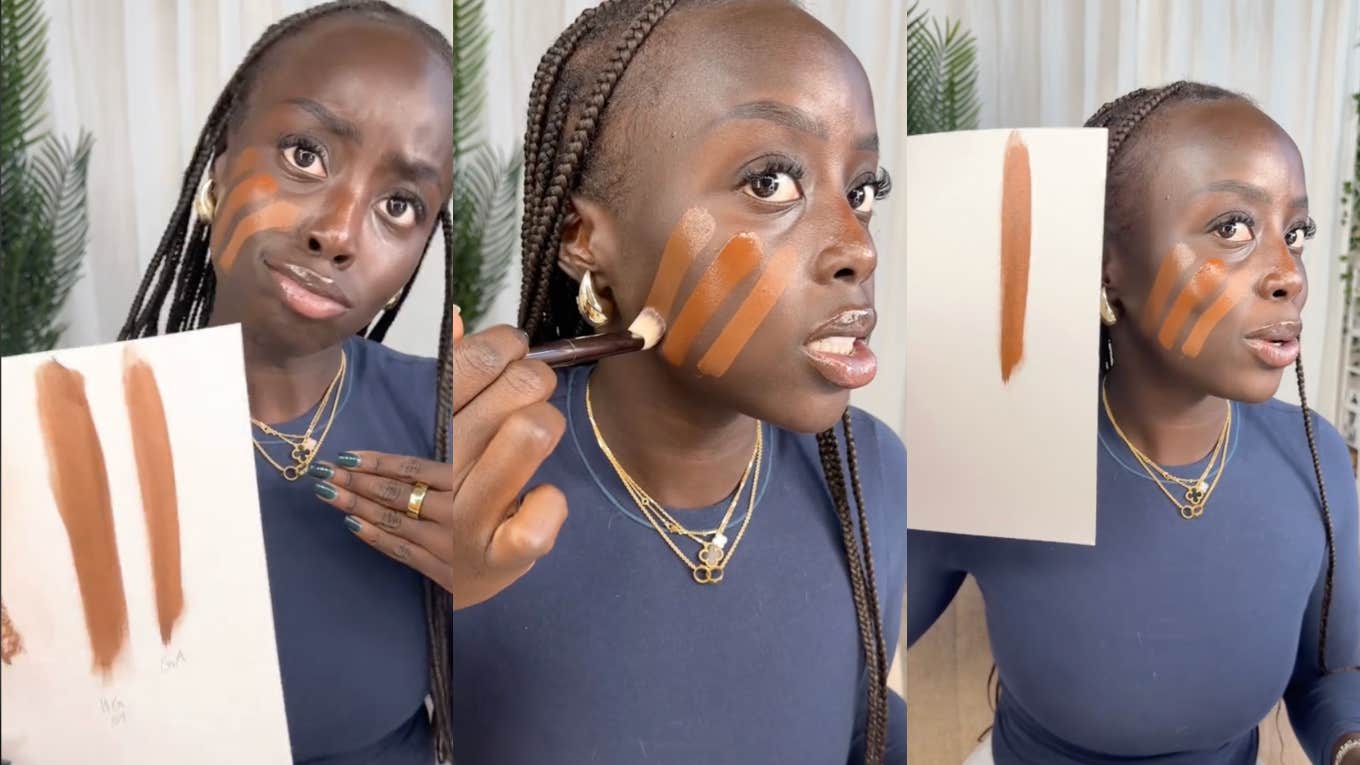Woman Calls Out Beauty Brands For Falsely Advertising Inclusive Makeup Shades For Dark-Skin Women — 'It's Already Hard To Find Shades'
She pointed out that in 2023, makeup companies need to start doing better.
 @golloria / TikTok
@golloria / TikTok A Black beauty influencer has sparked a conversation about the importance of brands having more inclusive shade ranges after revealing that several makeup companies are failing drastically.
In a TikTok video, a popular content creator named Golloria George, who makes lifestyle, makeup, and fashion videos, showed how far the beauty industry has to go when it comes to inclusive shades.
She called out beauty brands for falsely advertising shades that cater to dark-skin women.
In George's video, she swatched three different foundations on her face to show just how off they were from her actual complexion. She had one foundation from Giorgio Armani and two from Hourglass Cosmetics, which were all too light for her, even though the website claimed the shades were to match dark-skin women.
"This should not be your darkest shade in 2023. This is not true inclusion, but let's actually talk about it," George strongly remarked. She explained that so many of these makeup brands are notorious for marketing their shades online to be darker than they are, most likely as an easy way to say they are diverse and inclusive without actually having to put in the work.
George debunked the color theory argument, which is what many brands use for their lipsticks, blushes, and eyeshadows that make them look different on various skin tones. But for foundations and concealers, the shades should be exact.
"For these three to be your darkest shades — you're not being fully honest about how the shade actually looks online," she continued.
To prove her point, George got out a white piece of paper and swatched all of the foundations onto it. True to her word, even on a white sheet of paper, the shades were nowhere near appropriate for a dark-skin woman to wear.
"These makeup companies are just not inclusive. They make these shades darker than they actually are. It's already hard to find shades whenever you have a dark complexion," George pointed out. "The bare minimum is to make sure that the shades you guys are marketing online actually look like the models in the swatches."
George's frustration highlights the need for makeup brands to do better when it comes to having diverse shades.
The incident with Giorgio Armani and Hourglass Cosmetics that George brings to attention in her video serves as a reminder of a much broader issue in the beauty industry. In an attempt to appear inclusive, these brands are outright lying and choosing not to put in the work to cater to dark-skin women.
According to Glamour Magazine, a 2018 survey conducted by a Toronto-based company called Makeup for Melanin Girls, their founder, Tomi Gbeleyi, polled 5,500 women and found that 80% faced challenges in finding foundations that matched their complexions.
These issues have been happening consistently, and it wasn't until Rihanna launched Fenty Beauty, that Black women were finally able to break away from either not being able to find a product that matched their skin or having to mix multiple different products just to find their perfect shade.
Fenty Beauty became the first makeup company to release 40 shades in its first release. Not only that, but Rihanna made sure to pay attention to undertones, and the brand has since expanded to 50.
It isn't a hard feat for these other makeup companies to actually care about their consumers, and think long and hard about the sheer disappointment that comes with not being able to find something as simple as the correct shade of foundation and concealer.
Whether this means having more Black people in the marketing rooms and meetings when it comes to discussing shades or taking the time to research different undertones and skin colors, it's time for these companies to genuinely reflect on their lack of diversity.
Nia Tipton is a Chicago-based entertainment, news, and lifestyle writer whose work delves into modern-day issues and experiences.
